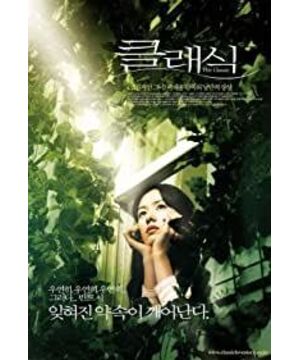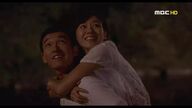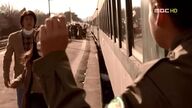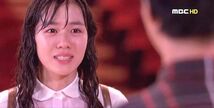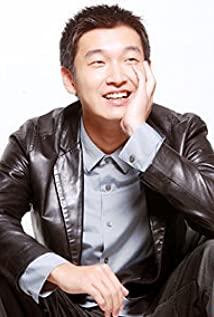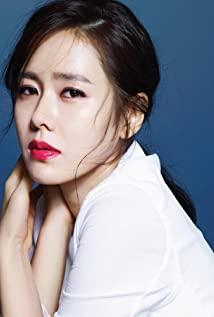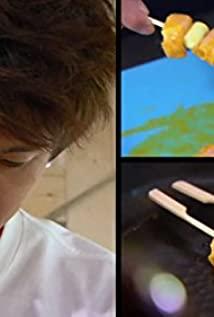The past is narrated in the advancement of the camera.
The cut of a montage shot switches the time and space from Jun Ha's photo to Jun Ha at that time. The shot is smooth and natural, and the connection is appropriate, which does not make people feel artificial and far-fetched. This film inherits the usual slow rhythm and sense of picture of Korean movies. Like an ink painting scroll, it slowly spreads out, with soft splashes of ink and delicate brushstrokes. In the intermittent and flickering narratives, there is no need for words. Maybe this is the emotion of love, and the fragrance floats.
The several time-space interludes that unfolded from this were all based on this montage, and in another photo that followed, the camera switched to their encounter. By the river that runs through the river, a few young sunshine teenagers are playing in the river, and Zhuxi sitting on the back of the cow is gentle and demure, and the little love germinates with such a wave of hands and a smile.
The film uses a lot of long shots in their subsequent stories. The sky under the gentle tones, the sparkling water, the little he and the little she, a wooden boat slowly paddling on the water. Time seems to have stopped flowing in this series of distant views and slow motion, only the quiet breathing and each other's heartbeats. One is a simple and kind boy in the village, and the other is a gentle and demure little girl in the city. With a fresh and curious mind, he brought her into a paradise that has never been seen before. At this time, the picture is almost beautiful, with the wind blowing and the grass low, the sky full of stars, and the fireflies scattered in the corners of the night.
Invest in wood peach, and repay it with Qiong Yao. Joo-hee gave Joon-ha her necklace, and this necklace became a clue throughout the whole story.
In addition, the film also uses a series of empty shots and backlighting techniques, which are also just right. The backlit profile of Joo-hee's father sitting in the room, a metaphor for the discovery of this relationship that was not recognized by parents and the world.
However, people who love each other, even if they are far away, can be held together by a single thread. This thread is the communication between them.
At this time, a set of lens assembly was used. It's sunny, raining, snowing outside the window, as long as they open the window, they see the same world, you have me in your eyes, and I have you in my eyes.
The time and space were switched back to today, and a long slow motion was used to interpret the picture of the heroine running in the rain to return the umbrella. The hero stood on the stage waiting for the upcoming heroine, and then various picture frames were rotating. The pictures they cut off from time to time looked at each other with a little caution and panic. The slow motion fully expresses the emotion between them here, warm and slow, like a trickle but it is also gushing out.
Many things happened in the middle, including the discovery of the relationship, the hanging of the second male, etc., which pushed the film to a small climax, and Jun Ha left the necklace and joined the army. At the parting train station, the camera kept switching with Zhu Xi's blank eyes, and finally settled on Jun Ha's stern face. The injury parted, but at this time, the only thing she hoped was his repeated whispers, "Jun Ha, come back alive!"
A long-shot heroine chased the train for a long time, and finally, the necklace returned to the hero's hand again. inside. It's their passion. It is also what he then fought so hard to protect in the battlefield. Some things are deeply rooted in your bones and cannot be given up.
The camera moves through the chaotic war scene, and Jun Ha's relentless determination reminds me of the sentence "Tell the head of the state, I have done my best; tell my father, I still love him." At this time, through the language of the screen, the emotion of the film has been rendered to a certain extent. Degree. Therefore, when we meet again in restaurants after many years, people will lose control and cry. He forcefully appeared in front of her, as if everything was the same as before, but the fact was that he was blind, and he lied to her that he was married. For a man, sometimes it is indeed more difficult to give up than to grasp. If she can't give the other party happiness, her life will be fulfilled. Perhaps it is the real love that we cannot understand.
Later, another photo appeared, and the camera slowly pulled away. It was a wedding photo of the heroine with tears. In fact, is the so-called fulfillment the real happiness? I don't think so. Sometimes, the loss of a person makes the whole world less important, and being together is all that matters, but the male protagonist doesn't seem to be able to understand.
Joo-hee's daughter and Joon-ha's son, yes, they're back at that river again. By the river, the film uses a 360-degree rotation shot that circles them. Everything started slowly, and finally he carefully took out the necklace around his neck with tears in his eyes, and each other's eyes were full of surprise and emotion. Does it also correspond to the name of the film? If love has God's will, it will continue in another way.
Yes, I still love you, through other people, other loves.
Finally, the film ended quietly in the tranquility of the couple.
The fly in the ointment is that the continuation of the love in the film is not good enough. The male protagonist's son is a "princely" man who has outstanding appearance, but the character is not vivid and lacks spirituality. And the second paragraph of love is just a continuation, far less profound than the first paragraph, it seems to be a bit deliberate, but less bland and meaningful.
In general, this MTV-style film is a very good interpretation of pure love. The love in the film is simple enough and firm enough, the male protagonist has a warm and attractive temperament, and the characters in the play are three-dimensional, full, and intriguing. It's a good movie worth watching.
View more about The Classic reviews


